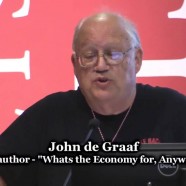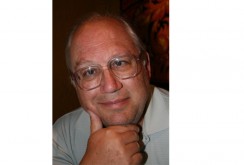
Black Friday is coming. You’d have to have been living in a hole not to know that means the day after Thanksgiving, when most businesses are closed but all the stores are open for business. It’s when the big holiday sales used to begin—now they begin on Thanksgiving itself; it seems we can’t take a single day just to be with each other and refrain from shopping.
But Black Friday is when the crush comes, when, some years, people die in the stampedes to get to the merchandise first and haul home the largest big screen televisions. In many cases, they’ve waited hours outside in rain, sleet or snow. They might get a real fever later for their exposure to the elements, but they’ve already got one—shopping fever, the first symptom of the dread disease I’ve called Affluenza in my film and book of that name.
But I learned in making the movie that there is a different way to celebrate Black Friday. A group of anti-consumerism activists in Vancouver, British Columbia, started it twenty years ago. They call it “Buy Nothing Day.” I followed them one day in 1996 as they ran around the streets of their city tagging department stores with posters urging people not to buy anything at all on the day after Thanksgiving, which even in B.C. was the biggest shopping day of the year.
In Seattle that year, a crowd gathered in Westlake Plaza to celebrate Buy Nothing Day on Black Friday. A group of elderly women in funny hats called “The Raging Grannies” sang off-key songs with lines like “the planet needs humanity, not another mall.” A young woman invited passers-by to cut up their credit cards. Amazingly, many did. The younger woman was inspired by a then best-selling book that should still be required reading—Vicki Robin’s Your Money or Your Life.
Robin and her co-author, the late Joe Dominguez, argued that every dollar spent represents life energy expended in work. You want to get real satisfaction for those dollars. But splurging on big TVs simply doesn’t do it. Psychologists like Ryan Howell (www.beyondthepurchase.org) and Leaf Van Boven have shown how experiences—a camping trip, for example—bring more long-lasting satisfaction than stuff. Even better, if you want to be really satisfied, give the gift of time to loved ones, instead of glitter.
On Black Friday, you don’t have to be a purist and buy nothing at all. But if you do spend money, shop locally and differently. Buy products that support local craftspeople and entrepreneurs, or buy Fair Trade or otherwise-certified products that help poor people thrive in developing countries or ensure sustainable management of resources. It takes a bit more planning than just going for the hot-ticket home entertainment center, but it might leave a positive lasting legacy.
Whatever you do this Black Friday, consider its effects on the planet. How many resources, how many fossil fuels have been used up to make the products you’re buying? My personal hero was the famous environmentalist David Brower, who built the Sierra Club and founded Earth Island Institute, on whose board I now serve. He died in 2000. More than forty years ago, Brower pointed out that we don’t really inherit the earth, so much as borrow it from future generations, against whom we are “committing grand larceny.”
“Ours is a chain letter economy, in which we pick up early handsome dividends and our children find their mailboxes empty,” he once said, a generalized metaphor that seems frighteningly real in this culture of unparalleled greed. In short, we’re getting all the stuff and our progeny will get a planet left uninhabitable by climate change and resource exhaustion.
More than a hundred years have passed since Brower’s birth. That may seem like a long time to us, but as he regularly pointed out in his short speech called “The Sermon,” it is but an instant in the geological span. Brower compressed the age of the Earth (more than four billion years) into the Biblical Week of Creation.
In that metaphorical light, the dinosaurs were around for five hours or so, humans have been here but a few minutes, and a hundred years represents only a small fraction of a second. In that last blink of an eye in geological time, Brower explained, we’ve used nearly all the resources ever consumed by human beings, depleted our soils and forests and fisheries by half, destroyed countless species and perhaps irrevocably altered the climate.
“There are people who think what we’ve been doing for the last fraction of a second can continue indefinitely,” Brower used to say. “They are considered reasonable people, but they are stark raving mad.”
Remember his words on this year’s Black Friday, when you’re tempted to take home a shopping basket full of stuff.











